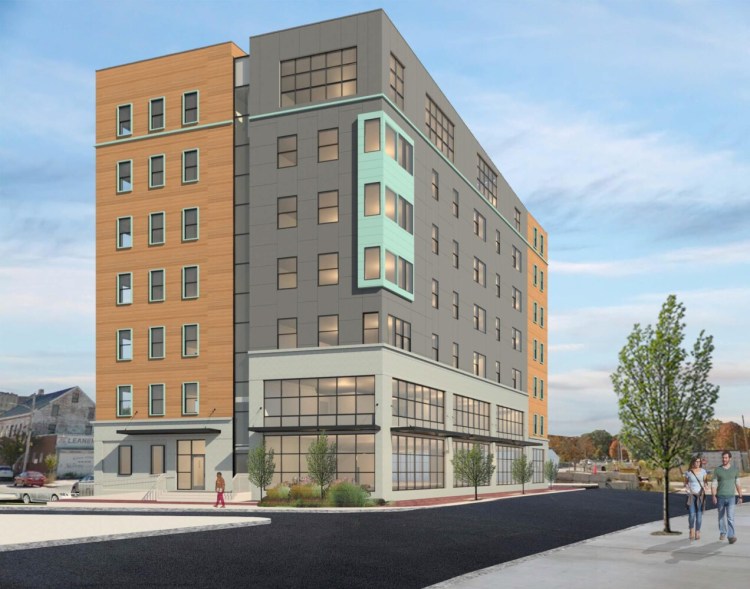The redevelopment of former city land in Portland’s Bayside neighborhood will enter a new phase Wednesday, when developers break ground on a high-rise apartment building.
The Szanton Co. and landowner Ross Furman plan to put up a seven-story building at 178 Kennebec St., the corner of Parris and Kennebec streets. The building will include a mix of affordable and market rate one-bedroom and studio apartments restricted to tenants at least 55 years old. Artist studios and galleries are intended on the ground floor.
The Furman Block will be built on the former parking lot for Portland’s old public works garage. The .22-acre plot was one of four city-owned parcels along Parris and Hanover streets that Portland sold to private owners for $4 million in 2017. The Furman property, one of the smallest, cost $250,000.
At the time, city councilors said the sale was intended to help recast the industrial area into a modern urban neighborhood. The new building is close to restaurants, supermarkets, Deering Oaks and Back Cove parks and Interstate 295.
It is near refurbished buildings like Bayside Bowl and around the corner from a new condo complex.
“So many exciting things are happening in the Bayside neighborhood of Portland right now,” said Szanton Co. President Nathan Szanton in a news release Tuesday.
“The city’s decision to move its public works department out of Bayside and sell that land for private development was far-sighted, and is really paying off,” Szanton added. “We’re seeing new housing, offices, and restaurants down there. The neighborhood – which is so close to downtown – is really being discovered.”

The Furman Block will have 51 total units, with most reserved for those making at or below 50 percent to 60 percent of the area’s median income. In other terms, those apartments have an income ceiling of $32,550 to $44,640 for one person and $44,640 to $53,568 for a couple.
Eleven units will be rented at market rate. Monthly rents range from $780 for a studio to $1,300 for a market-rate apartment, a company representative said.
The building received significant local and federal financial assistance. Low-income housing tax credits paid for almost a quarter of the $12.2 million project, a standard way to pay for low-income and affordable housing.
Last year, Portland agreed to give developers $370,000 in housing construction funding it receives annually from the federal Department of Housing and Urban Development. Around the same time, city councilors unanimously approved a tax break that will return almost $2.9 million in property taxes to developers over 30 years to pay for building operations, more than $96,000 a year.
Without some subsidies and public financing developers wouldn’t be able to build affordable housing at all, said Amy Cullen, vice president at The Szanton Co.
“To offer rents at reasonable rates, you need public assistance,” Cullen said.
Comments are not available on this story.
Send questions/comments to the editors.



